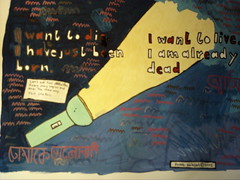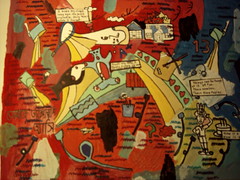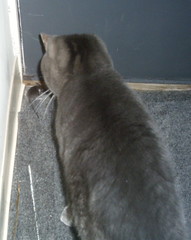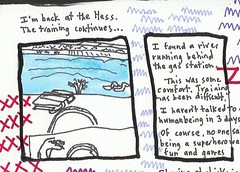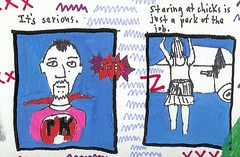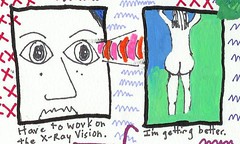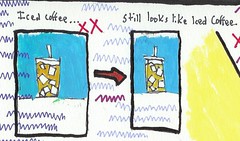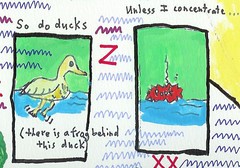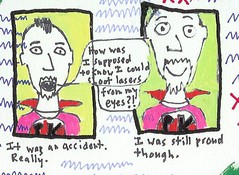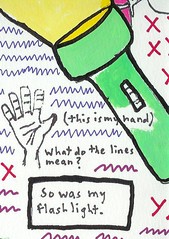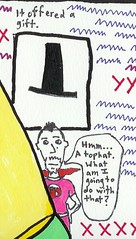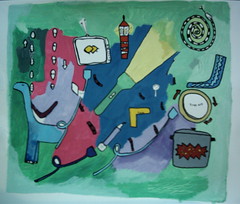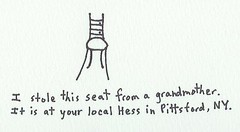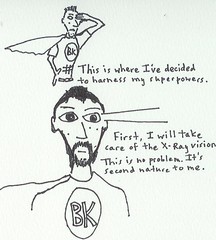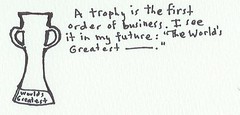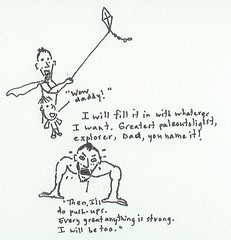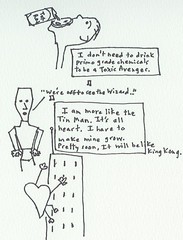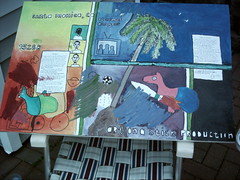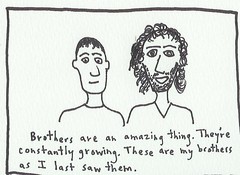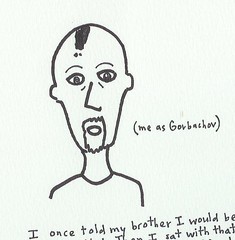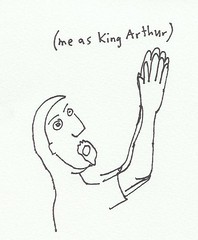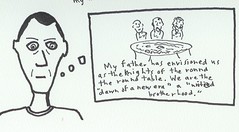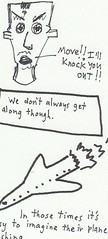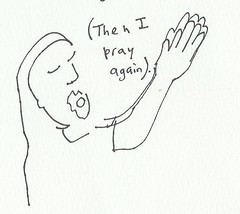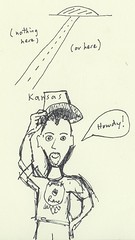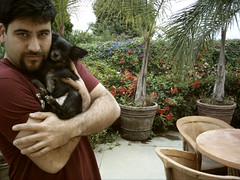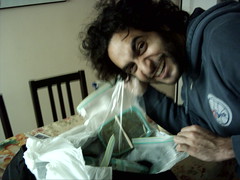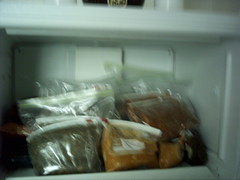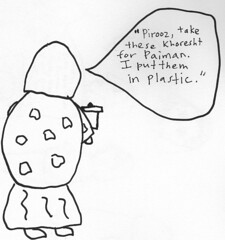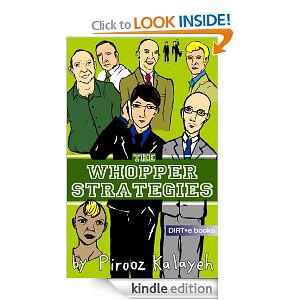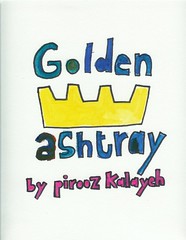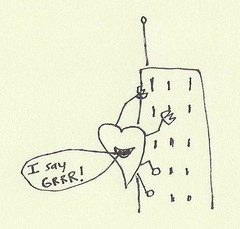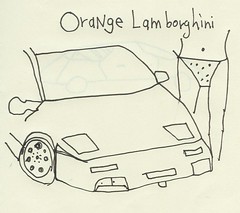It looks like I might be leaving for California sooner than expected. I am going to try and raise some funds here, and then head out. Maybe around July 11th. It would be great to know how the world could help this venture. I might stop in Philly for the night, so Meina or Tracey, it would be great to know if I could crash. The next stop will be St Louis, then Colorado, and then a mad dash for L.A..
Stacey, John, or Richard, if you can hook me up with a gig at your production company, or just a place to stay for a couple nights, it would be immensely appreciated.
I will give a definite leave date next week.
Wish Me Luck,
Pirooz
A Star Again
I blew into my soul one breadth. This hot toxic avenger was the beginning of my life. I awoke 3 days later. I was in a room. It was white. I called for help. No one came. Then I tasted my breadth. It was new. It was a car. I was a Honda Accord. Hello. Now I’m a pit-bull. Hello. Now I’m a monkey. Hello. Now I’m you. Hello. Now I’m just a star again. That gets 2 hello’s. One for the Sun, the other for me. Right in the mirror. Hello. It’s okay. Now we can smile. Hello. Hello.
Conversation with Bono
from Bono by Michka Assayas.
Assayas: ...Maybe I shouldn't tell you that, but during the show [2001 Elevation Tour] I had this appalling fantasy of someone with a gun in the audience. I felt that Mark David Chapman thing could happen there. Did it ever cross your mind?
Bono: Yeah, we had that. As you know, I don't travel with security. I grew up around a low but significant level of violence. We always feel like a row or an argument or a grievance in Ireland or France could end up with a bottle smashed in your face. Guns are not pervasive. In America, any crockpot can get their hands on a gun, and we've had a fair share of crackpots over the years. At the end of the eighties, we campaigned for Martin Luther King Day. I remember, in Arizona, we got into trouble, and we had some death threats. Normally, they happen. But occasionally, you get one that the police and FBI take seriously. There was a specific threat: "Don't go ahead with the concert. And, if you do, don't sing 'Pride (In the Name of Love),' because, if you do, I am gonna blow your head off, and you won't be able to stop this from happening." Of course you go onstage and you put it out of your head. But I do remember actually, in the middle of "Pride," thinking for a second: "Gosh! What if somebody was organized, or in the rafters of the building, or somebody, here and there, just had a handgun?" I just closed my eyes and sang this middle verse, with my eyes closed, trying to concentrate and forget about this ugliness and just keep close to the beauty that's suggested in the song. I looked up, at the end of that verse, and Adam was standing in front of me. It was one of those moments where you know what it means to be in a band.
I love this. It moves me so much. To be part of a band. This band. These writers. All of you. Thank you. I stand alongside you. I wish you all the best. Keep blogging. I'll keep reading. And let's get together for godsakes. Jim, you are too far away. Kyle, Melissa, and Sara, I will come visit Frisco soon. Teresa, Sean, Thomas, and Marlowe come visit or move to Cali. Same with you Langley. Let's get the band in proximity, or, at the very least visiting, and going out to experience life standing together.
That is what I miss the most from all of you. Just your presence.
Love, Pirooz
Assayas: ...Maybe I shouldn't tell you that, but during the show [2001 Elevation Tour] I had this appalling fantasy of someone with a gun in the audience. I felt that Mark David Chapman thing could happen there. Did it ever cross your mind?
Bono: Yeah, we had that. As you know, I don't travel with security. I grew up around a low but significant level of violence. We always feel like a row or an argument or a grievance in Ireland or France could end up with a bottle smashed in your face. Guns are not pervasive. In America, any crockpot can get their hands on a gun, and we've had a fair share of crackpots over the years. At the end of the eighties, we campaigned for Martin Luther King Day. I remember, in Arizona, we got into trouble, and we had some death threats. Normally, they happen. But occasionally, you get one that the police and FBI take seriously. There was a specific threat: "Don't go ahead with the concert. And, if you do, don't sing 'Pride (In the Name of Love),' because, if you do, I am gonna blow your head off, and you won't be able to stop this from happening." Of course you go onstage and you put it out of your head. But I do remember actually, in the middle of "Pride," thinking for a second: "Gosh! What if somebody was organized, or in the rafters of the building, or somebody, here and there, just had a handgun?" I just closed my eyes and sang this middle verse, with my eyes closed, trying to concentrate and forget about this ugliness and just keep close to the beauty that's suggested in the song. I looked up, at the end of that verse, and Adam was standing in front of me. It was one of those moments where you know what it means to be in a band.
I love this. It moves me so much. To be part of a band. This band. These writers. All of you. Thank you. I stand alongside you. I wish you all the best. Keep blogging. I'll keep reading. And let's get together for godsakes. Jim, you are too far away. Kyle, Melissa, and Sara, I will come visit Frisco soon. Teresa, Sean, Thomas, and Marlowe come visit or move to Cali. Same with you Langley. Let's get the band in proximity, or, at the very least visiting, and going out to experience life standing together.
That is what I miss the most from all of you. Just your presence.
Love, Pirooz
Love's Lullaby (Kyle as Me) *4 Sale*
This was feverishly done this morning. It is a response and show of gratitude to Kyle Kaufman.
This is the fourth in the Light Series.
It is now available as well.
My father's response to this painting was, "Is too much work."
"No, it's just the right amount," I told him.
He thinks my paintings are worth more than what I'm selling them for. He wants me to copy them at Kinko's.
"I am not attached," I told him.
"Really?" he asked.
"Really," I said.
It's for you guys out there. It's for me to make some extra cash. And, this one, in particular, is for you, Kyle. Keep blowing that horn. My heart thumps with you.
Love, P to the XYZ
This is the fourth in the Light Series.
It is now available as well.
Buy it HERE
My father's response to this painting was, "Is too much work."
"No, it's just the right amount," I told him.
He thinks my paintings are worth more than what I'm selling them for. He wants me to copy them at Kinko's.
"I am not attached," I told him.
"Really?" he asked.
"Really," I said.
It's for you guys out there. It's for me to make some extra cash. And, this one, in particular, is for you, Kyle. Keep blowing that horn. My heart thumps with you.
Love, P to the XYZ
Fiery Childhood *Painting for Sale*
This is the 3rd in the Light Series. It is on sale at ebay now. Please come make a bid. As usual, these start at $1.
Buy it HERE
Gorbachov Brings the Pain
I woke up last night to the squeals of some strange beast. Lo and behold it was a tiny mouse caught in the gaping mouth of Gorbachov (the cat).
Gorby shook the tiny critter in his mouth before spitting him out onto the floor. The mouse (AKA Jerry), then proceeded to squeal and stuck its four little paws into the wind.
Gorbachov satisfied the Cold War was over laid on his haunches to admire his kill.
“Meow,” he says to me.
“Yes,” I agree. “The Cold War is over.”
Then Jerry pops up and scurries 3 steps before Gorbachov swats him down, clamps him between his jaws, gives him a couple quick shakes, and spits him out again.
Jerry, unafraid of repeating himself for entertainment, squeals and plays possum.
"Don't believe this Western doddle maker!" I shout to my feline friend. "Bring the pain!"
Gorbachov not one to sway under pressure, took this command like any true Bolshevick - off into uncharted territory.
I managed to get a snapshot for posterity. The headline in Moscow was aptly titled, "Cold War Just Beginning."
We admired the photo together.
"Meooow," Gorbachov smiled.
"Yes," I laughed. "Glasnost is one squeal away."
Gorby shook the tiny critter in his mouth before spitting him out onto the floor. The mouse (AKA Jerry), then proceeded to squeal and stuck its four little paws into the wind.
Gorbachov satisfied the Cold War was over laid on his haunches to admire his kill.
“Meow,” he says to me.
“Yes,” I agree. “The Cold War is over.”
Then Jerry pops up and scurries 3 steps before Gorbachov swats him down, clamps him between his jaws, gives him a couple quick shakes, and spits him out again.
Jerry, unafraid of repeating himself for entertainment, squeals and plays possum.
"Don't believe this Western doddle maker!" I shout to my feline friend. "Bring the pain!"
Gorbachov not one to sway under pressure, took this command like any true Bolshevick - off into uncharted territory.
I managed to get a snapshot for posterity. The headline in Moscow was aptly titled, "Cold War Just Beginning."
We admired the photo together.
"Meooow," Gorbachov smiled.
"Yes," I laughed. "Glasnost is one squeal away."
The Traning Continues *Painting for Sale*
I'm back at the hess.
I found a river behind the gas station.
This was some comfort.
Training has been difficult.
I haven't talked to a human being in 3 days.
Of course, no one said being a superhero
was fun and games.
It's serious.
(Staring at chicks is just a perk of the job.)
Have to work on the X-Ray vision.
I'm getting better.
Iced coffee...
Still looks like iced coffee though.
So do ducks.
Unless I concentrate...
How was I supposed to know I could shoot lasers from my eyes?!
It was an accident. Really!
I WAS STILL PROUD THOUGH.
SO WAS MY FLASHLIGHT.
It offered a gift. Hmmm.
What was I going to do with that?
STAY TUNED for the next installment.
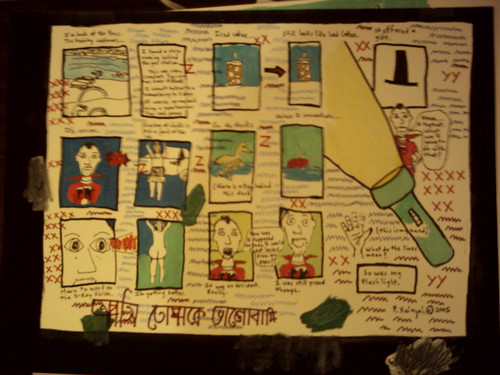
"Novel Enters the Light." is on sale at ebay right now. It is the second in the Light Series.
I found a river behind the gas station.
This was some comfort.
Training has been difficult.
I haven't talked to a human being in 3 days.
Of course, no one said being a superhero
was fun and games.
It's serious.
(Staring at chicks is just a perk of the job.)
Have to work on the X-Ray vision.
I'm getting better.
Iced coffee...
Still looks like iced coffee though.
So do ducks.
Unless I concentrate...
How was I supposed to know I could shoot lasers from my eyes?!
It was an accident. Really!
I WAS STILL PROUD THOUGH.
SO WAS MY FLASHLIGHT.
It offered a gift. Hmmm.
What was I going to do with that?
STAY TUNED for the next installment.

"Novel Enters the Light." is on sale at ebay right now. It is the second in the Light Series.
Buy it here
Six Degrees of Line Breaks: A Conversation with Jim Goar
“A line break is apparent, but why it is there, often times, is not. I believe a line break should serve a function that conjunctions and punctuation can’t. Can a period serve as a breath count? How about a comma? Many of my earlier poems began lines with conjunctions. This too felt like cheating (of course some lines might begin with a conjunction, but if too many do, it is a crutch). So why break? Why not write in blocks?”
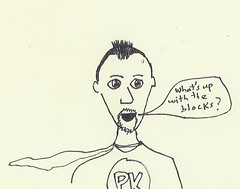
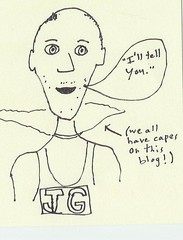
Pirooz Kalayeh: What do you mean about writing in blocks?
Jim Goar : Lately I’ve been playing with a form I call grouping. Instead of breaking for breath, which can change, I break according to group. This group has nothing to do with the intention of the poem. The intention of the poem does not change. What it says, it still says. But each line says something different. Each line is responsible for itself. However, each line is also responsible to the line before and the line after, in that those lines change meanings of the line before. for example: Line 1 Subject Verb Object but if read continually with line 2, the object in line 1 might be the subject, or adjective or verb of line 2. Even though when reading line 2, if we read line 2 by itself, its form might still be Subject Verb Object.
so when reading the lines separately
Line 1: Subject Verb Object
Line 2: Subject Verb Object
But when read together
Line 1: Subject Verb Object/subject (Line 2)
Line 2 verb adjective Object
So, when this is working, and I’ve yet to get it exactly right (bc, of course, it still must act like a poem, and if this form must be sacrificed to make the poem work, then no question, it gets sacrificed. So sometimes in a 10 line poem, grouping only happens on a few lines.), each line is responsible to itself, the one before, and the one after. And these readings need to be meshed to get a true read of the poem. It is a great way to condense and the condensing is more than the sum of the parts, bc the parts are inside of each other.
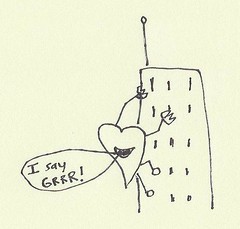
PK: I would define heartspeak as being the truest voice an author has available to them. How would you describe your heartspeak?
JG: I don’t really know what this means. Seems the truest voice I have is when things work. I am not so interested in heartspeak. I am much more interested in creating something that exists, not something that represents something that exists. Maybe heartspeak falls inside the former category. I don’t really know. when I write, I certainly don’t think about it. I really don’t think about the grouping anymore, either. I guess at the beginning you practice consciously, then you work from muscle memory, you stop thinking. No poem is without rules. Just sometimes those rules are buried deeper than end line rhymes.
Help me with heartspeak and why it is important. Do you like any poem (i.e. believe a poem works. Enjoy that poem etc) that does not have heart speak?
PK: Heartspeak is a term I use to describe that moment when there is no effort behind a created work. It flows naturally and organically. I would say every work of art has a certain amount of heartspeak. The degree to which an artist can gauge their individual heartspeak comes from the artist themselves. No one else can judge this or have a definite answer. Only the artist themselves can answer this question with any amount of truth.
When do you know you are inside heartspeak? In our last chat, you described an interest in creating something that exists, not something that represents something that exists. Is this your heartspeak? You define it, my friend. What is it for you?
JG: the effortless writing. I see. I haven’t had that in some time. I have the non thinking, but the revision always entails a certain amount of effort. But in this revision, this cutting away and adding, there are little glimpses. Words come up that I have not heard in years, words that I don’t know where they come from, so I put them in bc they sound right and later look them up and they make sense. There is something going on that I am unaware of and I’ve learned to trust it. Never too hard to erase. But there is discipline. The ability to stay at the computer for long enough, but not too long to begin hating.
When I begin, I am often times happy with that first draft and the first few revisions. I take a break and come back and there are plenty of messes. So I play. Sometimes no progress is made. Other times I feel, “Ok, now it is ready”. Go away. come back, it is not ready. Sit long enough. work. make changes. Those changes entail other changes. And this goes on. Sometimes for days. But in the final move. Something just clicks, that hadn’t clicked before, that lets me know that the other "finishes" were false. Now it seems that every joint fits into place. And this is what I mean that it does not represent anything. It is just a conglomeration of knots that, in the end, line up, and in this stacking there is sense. There are connections. These connections exist in sound, in associations, in connection of lines. There are so many things that must fit for this work to be acceptable to me. Most, I feel, I am unaware of. I usually play by feel.
Back to the effortless. I guess I would say that first move is effortless. When the words come pouring out. Before I ask it any questions.
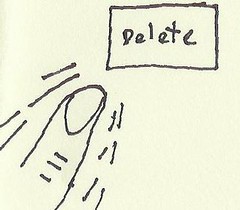
PK: Your 'messing' is very similar to painting for me. There are moments when a painting is almost done, and I continue to add or subtract elements. Many times those who are witnessing the process begin to protest. "Don't mess it up," they say.
I don't really pay any attention. There is something else I'm pushing through. It may collapse on itself, but if I remain confident, and lose my fears around 'messing it up', then it usually comes out much more beautiful than I could have ever imagined.
In a sense, I am challenging myself beyond what I am capable. And from that experience, I discover new tools to overcome where I had previously remained content. This growth is a very vital part of creation for me.
Have you found yourself discovering new tools during this process of 'messing.' And, if so, what are some of them?
JG: Messing around entails a certain playfulness. We can’t take our work too seriously. I am not saying that I don’t take the fact that I am a poet seriously, just that I don’t take the creation of the work seriously. Can’t. When I do it does not move. When my intentions remain from beginning to end, the poem remains from beginning to end. I can’t kick what ails it. Often times what is wrong with it is exactly what I originally thought I wanted to say. That line that got me to the computer, a damn good line, often times serves only to get me to the computer. In the end, it is gone. That said, I have written a few poems in under three minutes that rock. But that is rare. Usually the poem becomes what it is only after I say I don’t know what it wants. When I’ve got all these words out there and just allow myself to be a reader, lets me become more passive, I observe. I think in this observation there is a playfulness, a messing around. When I no longer have a stake in it, I am no longer afraid or indebted to it; I am more easily able to see what direction it wants.
I guess these are tools. Now I have a question for you. You mention that in painting you do the messing around. In painting there is no delete button. Seems you have more at stake. I was reading this essay over at J Seth Abramson’s blog.
What do you think about the idea that we need to learn when to put something away, or have it taken away. That if there is too much of us, it is ruined?
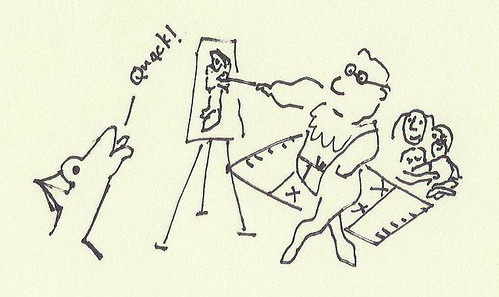
PK: Ah, yes. Mistakes in painting are the most beautiful thing in the world. Some painters simply start over (after a mistake) or apply liberal amounts of gesso (white) or some other darker color to move them past the mistake. For myself, I do not have mistakes. I welcome strange colors and images. Often times, I will glob paint onto a piece that is too perfect to bring it closer to reality. I will draw the blunt edge of the brush through the paint to cut scribbles into the drying paint beneath. When utilized, this creates a sense of wholeness to the painting, and allows for other elements (often times seen as catastrophes by other painters) to become a repeating motif throughout the piece. Nothing is taken away. This is simply another tool.
In Seth Abramson's essay on John Guare's "Six Degrees of Separation", he comments on how second graders are Matisse’s, until job responsibilities pull their inherent sublime creations into the 'camouflage' of their social/intellectual environment i.e. they grow up. Abramson's believes in order for artists to meet their artistic truth we need to "...simply cut away the intellectual entanglements which prevent us from translating our inherent genius into the inherent grace of Art..."
Ah, the innocence, yes. And, no.
I don't believe second graders are Matisse's. Matisse employed a child's approach to figures, but his employment of color and subject (nude models) was not very second grade.
In fact, from having worked with children for a considerable time, I have found that none have the ability to create the sublime, except those who will do so. Many of the kids I have worked with in acting classes, watched grow in the music scene, or taught drawing to, who showed natural talent, have simply carried the same voice they began with, and with their experiences help, have matured it into what it is presently.
Whether this is better or worse than their beginnings, is a matter of taste. There are some who will look at my students, or any other artist for that matter, and prefer certain earlier work over their later. This has nothing to do with how good it is. Just an editor's discretion for what fits their particular sensibility at the moment.
Like life, this issue of taste is constantly in flux. I may prefer child art to Language poetry one day, and vice-versa the next. No biggie.
There is no huge question being answered by identifying what you like in a particular moment. This is simply how you feel. Seth Abramson has a certain taste when it comes to soliciting work for The New Hampshire Review. He has equated what he likes with the innocent meanderings of a child. He believes we need to maintain that sense of play in order to reach the sublime. Good for him. He knows what he likes and what he's looking for. A certain sense of magic.
Of course, this is different for each person. I, myself, don't know what I'll like until I see it. I do not have any precursor. Sometimes I like the work of non-artists (a doodling on a napkin left on a kitchen counter). Sometimes I dig a poem that talks about crows, because I like crows. Sometimes I find beauty in a child.
And, it's usually beauty in the child. It's not their work as much as their passion to create it. This is what I would say separates older from younger. In some, the passion is not alight. They need to figure out what will catalyze their passion. They look at a child. Boom! They remember. That simple.
Certain artists are very peculiar. They are the ones who turn back to their own work for inspiration. It does not have to be something great (or something thought of as great); just a sentence from the past, a doodle in the left-hand-margin. Then, they remember. This is a secret I think every artist keeps to themselves, but once you realize there is no separation, it's pretty easy to let the world know all your secrets.
Now onto your last question. When is too much? Is there such a thing? I would say my art is a product of me. Everything I do to it is me. There is not more me I could put into it, because it is wholly me. There is not less either. It is just my choice. When I put down the brush, that's it. Enough for that day. I'm usually tired. It was 8 hours. Enough.
Of course, I could keep going endlessly with a piece. That is, if I was trying to make it perfect. But, you see, that's the problem right there. There is no perfection. Not for me. That would mean I would have to stop creating. That would mean I was done with making. I'm not done with making. Not now. Maybe, one day I will be.
I wonder if leaving ('putting something away') has more to do with a fear. If I was afraid to take a painting past the point of good to possibly failing (for me), and I simply reproduced mirror images of something safe, there may be a point where I need to confront that fear of letting something be delivered in a very arduous and difficult way.
That is what writing novels is for me. Each one is such a delivery. They take every bit of me to complete. That is why I have incorporated illustrations and albums with my latest novels. I just didn't have the time to exit the novel's world to do a side project. It was just the novel. What a difficult, sometimes easy, and exhilarating experience. Nothing better than doing novels for me.
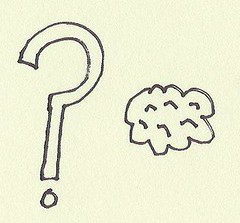
Now since you made me do homework on someone else's blog, I'll do the same for you. Have you heard of a book called Only Don't Know by Master Seung Sahn? Below is a brief excerpt of an interview with Sahn. In it, he explains 'don't know mind.'
(Click here to read interview)
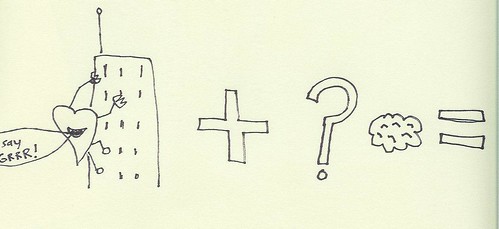
PK: Sahn’s practice is that through "don't know" mind one's illusions about identity can fall away. Then, there comes a moment when you make a choice. You just do it. You made a choice. Now do it. This is the Zen Way
How similar would you say this attitude is to your process of creation?
JG: I can only come at this from writing, but as a reader, a reader reading yr own work, don’t you ever say, “I like what was there before.” and press that little half circle key to delete what it was you last wrote? I love that little key. I love that I can save before moving on. I have hundreds of versions of a single poem, just a word here, word there, break here, break there, well, maybe not hundreds, more like 30 or so. You should have seen that fish I caught.
Anyway. I am down with the I don’t know. Or even, and this is a different question, "Even if I did know, what would I do differently?" I ask myself this question quite often. If the answer is “nothing” or “I would not change” then I stop asking the question. If the answer would make a difference to me, then I keep asking. I guess in the keeping asking, you are there with the thought and are in the “don’t know”.
It is all about curiosity. Every time we write a new world into being. Just a little world. Just our world. But those possibilities are endless. Where does the mind go next? I think the writing is the chewing. And here I’d like to say something about Life and writing. I believe they feed each other and are not mutually exclusive. However, when we are writing, bits of our ugliness come up. I believe this ugliness should be kept (homophobic, woman beater, bed wetter), bc, often times, this is what the work hangs on. this is the area that we most want to delve into. Especially if we are aware of it and want to change. But this change should not occur there, on the draft. On the draft the question is never, is this what I want to show? Is this ugly? Will people think less of me for it (the topic)? the question should be what the work needs. When we begin inserting other motives into the work, the work suffers. Ok, so now you are done with the work. You have looked at it, and you are tired of being mean to yr mother. But that piece is done, and that piece works. So now, you are aware, so now, STOP being mean to yr mother. Don’t do it on the page, do it in real life. Call her up and tell her you love her. And maybe, the next time you get down to writing, this topic won’t come up. Or else it won’t be so evident etc.
I know earlier I said that what brought me to the computer often times did not exist by the final draft. If the mother hating goes the way of the dodo bc it does not work, bc the work does not need it, then ok, that is exactly ok. But, if it goes swimming with the fish bc you are ashamed, and the poem falls apart, well, that is yr problem. You can write plenty of ugly poems. Not everything we write needs to be published.
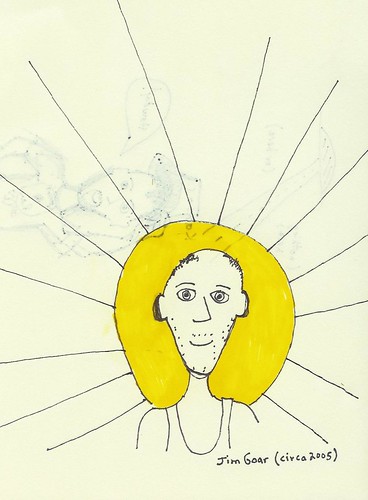
Jim Goar lives in Korea and teaches at Yonsei University. His most recent work can be seen at Typo, and his website, Can of Corn.
- Jim Goar
Part 1: The Line Break


Pirooz Kalayeh: What do you mean about writing in blocks?
Jim Goar : Lately I’ve been playing with a form I call grouping. Instead of breaking for breath, which can change, I break according to group. This group has nothing to do with the intention of the poem. The intention of the poem does not change. What it says, it still says. But each line says something different. Each line is responsible for itself. However, each line is also responsible to the line before and the line after, in that those lines change meanings of the line before. for example: Line 1 Subject Verb Object but if read continually with line 2, the object in line 1 might be the subject, or adjective or verb of line 2. Even though when reading line 2, if we read line 2 by itself, its form might still be Subject Verb Object.
so when reading the lines separately
Line 1: Subject Verb Object
Line 2: Subject Verb Object
But when read together
Line 1: Subject Verb Object/subject (Line 2)
Line 2 verb adjective Object
So, when this is working, and I’ve yet to get it exactly right (bc, of course, it still must act like a poem, and if this form must be sacrificed to make the poem work, then no question, it gets sacrificed. So sometimes in a 10 line poem, grouping only happens on a few lines.), each line is responsible to itself, the one before, and the one after. And these readings need to be meshed to get a true read of the poem. It is a great way to condense and the condensing is more than the sum of the parts, bc the parts are inside of each other.

Part 2: Heartspeak
PK: I would define heartspeak as being the truest voice an author has available to them. How would you describe your heartspeak?
JG: I don’t really know what this means. Seems the truest voice I have is when things work. I am not so interested in heartspeak. I am much more interested in creating something that exists, not something that represents something that exists. Maybe heartspeak falls inside the former category. I don’t really know. when I write, I certainly don’t think about it. I really don’t think about the grouping anymore, either. I guess at the beginning you practice consciously, then you work from muscle memory, you stop thinking. No poem is without rules. Just sometimes those rules are buried deeper than end line rhymes.
Help me with heartspeak and why it is important. Do you like any poem (i.e. believe a poem works. Enjoy that poem etc) that does not have heart speak?
PK: Heartspeak is a term I use to describe that moment when there is no effort behind a created work. It flows naturally and organically. I would say every work of art has a certain amount of heartspeak. The degree to which an artist can gauge their individual heartspeak comes from the artist themselves. No one else can judge this or have a definite answer. Only the artist themselves can answer this question with any amount of truth.
When do you know you are inside heartspeak? In our last chat, you described an interest in creating something that exists, not something that represents something that exists. Is this your heartspeak? You define it, my friend. What is it for you?
JG: the effortless writing. I see. I haven’t had that in some time. I have the non thinking, but the revision always entails a certain amount of effort. But in this revision, this cutting away and adding, there are little glimpses. Words come up that I have not heard in years, words that I don’t know where they come from, so I put them in bc they sound right and later look them up and they make sense. There is something going on that I am unaware of and I’ve learned to trust it. Never too hard to erase. But there is discipline. The ability to stay at the computer for long enough, but not too long to begin hating.
When I begin, I am often times happy with that first draft and the first few revisions. I take a break and come back and there are plenty of messes. So I play. Sometimes no progress is made. Other times I feel, “Ok, now it is ready”. Go away. come back, it is not ready. Sit long enough. work. make changes. Those changes entail other changes. And this goes on. Sometimes for days. But in the final move. Something just clicks, that hadn’t clicked before, that lets me know that the other "finishes" were false. Now it seems that every joint fits into place. And this is what I mean that it does not represent anything. It is just a conglomeration of knots that, in the end, line up, and in this stacking there is sense. There are connections. These connections exist in sound, in associations, in connection of lines. There are so many things that must fit for this work to be acceptable to me. Most, I feel, I am unaware of. I usually play by feel.
Back to the effortless. I guess I would say that first move is effortless. When the words come pouring out. Before I ask it any questions.

Part 3: Messing
PK: Your 'messing' is very similar to painting for me. There are moments when a painting is almost done, and I continue to add or subtract elements. Many times those who are witnessing the process begin to protest. "Don't mess it up," they say.
I don't really pay any attention. There is something else I'm pushing through. It may collapse on itself, but if I remain confident, and lose my fears around 'messing it up', then it usually comes out much more beautiful than I could have ever imagined.
In a sense, I am challenging myself beyond what I am capable. And from that experience, I discover new tools to overcome where I had previously remained content. This growth is a very vital part of creation for me.
Have you found yourself discovering new tools during this process of 'messing.' And, if so, what are some of them?
JG: Messing around entails a certain playfulness. We can’t take our work too seriously. I am not saying that I don’t take the fact that I am a poet seriously, just that I don’t take the creation of the work seriously. Can’t. When I do it does not move. When my intentions remain from beginning to end, the poem remains from beginning to end. I can’t kick what ails it. Often times what is wrong with it is exactly what I originally thought I wanted to say. That line that got me to the computer, a damn good line, often times serves only to get me to the computer. In the end, it is gone. That said, I have written a few poems in under three minutes that rock. But that is rare. Usually the poem becomes what it is only after I say I don’t know what it wants. When I’ve got all these words out there and just allow myself to be a reader, lets me become more passive, I observe. I think in this observation there is a playfulness, a messing around. When I no longer have a stake in it, I am no longer afraid or indebted to it; I am more easily able to see what direction it wants.
I guess these are tools. Now I have a question for you. You mention that in painting you do the messing around. In painting there is no delete button. Seems you have more at stake. I was reading this essay over at J Seth Abramson’s blog.
What do you think about the idea that we need to learn when to put something away, or have it taken away. That if there is too much of us, it is ruined?

Part 4: Matisse in Second Grade
PK: Ah, yes. Mistakes in painting are the most beautiful thing in the world. Some painters simply start over (after a mistake) or apply liberal amounts of gesso (white) or some other darker color to move them past the mistake. For myself, I do not have mistakes. I welcome strange colors and images. Often times, I will glob paint onto a piece that is too perfect to bring it closer to reality. I will draw the blunt edge of the brush through the paint to cut scribbles into the drying paint beneath. When utilized, this creates a sense of wholeness to the painting, and allows for other elements (often times seen as catastrophes by other painters) to become a repeating motif throughout the piece. Nothing is taken away. This is simply another tool.
In Seth Abramson's essay on John Guare's "Six Degrees of Separation", he comments on how second graders are Matisse’s, until job responsibilities pull their inherent sublime creations into the 'camouflage' of their social/intellectual environment i.e. they grow up. Abramson's believes in order for artists to meet their artistic truth we need to "...simply cut away the intellectual entanglements which prevent us from translating our inherent genius into the inherent grace of Art..."
Ah, the innocence, yes. And, no.
I don't believe second graders are Matisse's. Matisse employed a child's approach to figures, but his employment of color and subject (nude models) was not very second grade.
In fact, from having worked with children for a considerable time, I have found that none have the ability to create the sublime, except those who will do so. Many of the kids I have worked with in acting classes, watched grow in the music scene, or taught drawing to, who showed natural talent, have simply carried the same voice they began with, and with their experiences help, have matured it into what it is presently.
Whether this is better or worse than their beginnings, is a matter of taste. There are some who will look at my students, or any other artist for that matter, and prefer certain earlier work over their later. This has nothing to do with how good it is. Just an editor's discretion for what fits their particular sensibility at the moment.
Like life, this issue of taste is constantly in flux. I may prefer child art to Language poetry one day, and vice-versa the next. No biggie.
There is no huge question being answered by identifying what you like in a particular moment. This is simply how you feel. Seth Abramson has a certain taste when it comes to soliciting work for The New Hampshire Review. He has equated what he likes with the innocent meanderings of a child. He believes we need to maintain that sense of play in order to reach the sublime. Good for him. He knows what he likes and what he's looking for. A certain sense of magic.
Of course, this is different for each person. I, myself, don't know what I'll like until I see it. I do not have any precursor. Sometimes I like the work of non-artists (a doodling on a napkin left on a kitchen counter). Sometimes I dig a poem that talks about crows, because I like crows. Sometimes I find beauty in a child.
And, it's usually beauty in the child. It's not their work as much as their passion to create it. This is what I would say separates older from younger. In some, the passion is not alight. They need to figure out what will catalyze their passion. They look at a child. Boom! They remember. That simple.
Certain artists are very peculiar. They are the ones who turn back to their own work for inspiration. It does not have to be something great (or something thought of as great); just a sentence from the past, a doodle in the left-hand-margin. Then, they remember. This is a secret I think every artist keeps to themselves, but once you realize there is no separation, it's pretty easy to let the world know all your secrets.
Now onto your last question. When is too much? Is there such a thing? I would say my art is a product of me. Everything I do to it is me. There is not more me I could put into it, because it is wholly me. There is not less either. It is just my choice. When I put down the brush, that's it. Enough for that day. I'm usually tired. It was 8 hours. Enough.
Of course, I could keep going endlessly with a piece. That is, if I was trying to make it perfect. But, you see, that's the problem right there. There is no perfection. Not for me. That would mean I would have to stop creating. That would mean I was done with making. I'm not done with making. Not now. Maybe, one day I will be.
I wonder if leaving ('putting something away') has more to do with a fear. If I was afraid to take a painting past the point of good to possibly failing (for me), and I simply reproduced mirror images of something safe, there may be a point where I need to confront that fear of letting something be delivered in a very arduous and difficult way.
That is what writing novels is for me. Each one is such a delivery. They take every bit of me to complete. That is why I have incorporated illustrations and albums with my latest novels. I just didn't have the time to exit the novel's world to do a side project. It was just the novel. What a difficult, sometimes easy, and exhilarating experience. Nothing better than doing novels for me.

Part 5: Don't Know Mind
Now since you made me do homework on someone else's blog, I'll do the same for you. Have you heard of a book called Only Don't Know by Master Seung Sahn? Below is a brief excerpt of an interview with Sahn. In it, he explains 'don't know mind.'
(Click here to read interview)

Part 6: The Aftermath
PK: Sahn’s practice is that through "don't know" mind one's illusions about identity can fall away. Then, there comes a moment when you make a choice. You just do it. You made a choice. Now do it. This is the Zen Way
How similar would you say this attitude is to your process of creation?
JG: I can only come at this from writing, but as a reader, a reader reading yr own work, don’t you ever say, “I like what was there before.” and press that little half circle key to delete what it was you last wrote? I love that little key. I love that I can save before moving on. I have hundreds of versions of a single poem, just a word here, word there, break here, break there, well, maybe not hundreds, more like 30 or so. You should have seen that fish I caught.
Anyway. I am down with the I don’t know. Or even, and this is a different question, "Even if I did know, what would I do differently?" I ask myself this question quite often. If the answer is “nothing” or “I would not change” then I stop asking the question. If the answer would make a difference to me, then I keep asking. I guess in the keeping asking, you are there with the thought and are in the “don’t know”.
It is all about curiosity. Every time we write a new world into being. Just a little world. Just our world. But those possibilities are endless. Where does the mind go next? I think the writing is the chewing. And here I’d like to say something about Life and writing. I believe they feed each other and are not mutually exclusive. However, when we are writing, bits of our ugliness come up. I believe this ugliness should be kept (homophobic, woman beater, bed wetter), bc, often times, this is what the work hangs on. this is the area that we most want to delve into. Especially if we are aware of it and want to change. But this change should not occur there, on the draft. On the draft the question is never, is this what I want to show? Is this ugly? Will people think less of me for it (the topic)? the question should be what the work needs. When we begin inserting other motives into the work, the work suffers. Ok, so now you are done with the work. You have looked at it, and you are tired of being mean to yr mother. But that piece is done, and that piece works. So now, you are aware, so now, STOP being mean to yr mother. Don’t do it on the page, do it in real life. Call her up and tell her you love her. And maybe, the next time you get down to writing, this topic won’t come up. Or else it won’t be so evident etc.
I know earlier I said that what brought me to the computer often times did not exist by the final draft. If the mother hating goes the way of the dodo bc it does not work, bc the work does not need it, then ok, that is exactly ok. But, if it goes swimming with the fish bc you are ashamed, and the poem falls apart, well, that is yr problem. You can write plenty of ugly poems. Not everything we write needs to be published.

Jim Goar lives in Korea and teaches at Yonsei University. His most recent work can be seen at Typo, and his website, Can of Corn.
Light #1 *Painting For Sale*
This is the first in a series of 14.
I will put the others up as they're completed.
The starting bid is $1.
It is on a 12 x 16 Montaval Natural White (Cold Pressed and nice to touch).
I will personalize it with a poem on the back to the lucky winner.
Best,
Pirooz
I will put the others up as they're completed.
The starting bid is $1.
It is on a 12 x 16 Montaval Natural White (Cold Pressed and nice to touch).
I will personalize it with a poem on the back to the lucky winner.
Best,
Pirooz
The Birth of a Hero
I stole this chair from a grandmother. It is at your local Hess in Pittsford, NY.
This is where I've decided to harness my superpowers.
First, I will take care of the X-Ray vision.
This is no problem. It's second nature to me.
A trophy is the first order of business. I see it in my future: the world's greatest _____ .
I will fill it with whatever I want. Greatest paleontologist, explorer, Dad, you name it!!
Then I'll do push-ups. Every great anything is strong. I will be too.
I don't need to drink primo-grade chemicals to be a Toxic Avenger.
I am more like the Tin Man. It's all heart. I have to make mine grow. Pretty soon, it will be like King Kong.
This is where I've decided to harness my superpowers.
First, I will take care of the X-Ray vision.
This is no problem. It's second nature to me.
A trophy is the first order of business. I see it in my future: the world's greatest _____ .
I will fill it with whatever I want. Greatest paleontologist, explorer, Dad, you name it!!
Then I'll do push-ups. Every great anything is strong. I will be too.
I don't need to drink primo-grade chemicals to be a Toxic Avenger.
I am more like the Tin Man. It's all heart. I have to make mine grow. Pretty soon, it will be like King Kong.
Santa Monica, CA
My first painting has gone on sale. I will put others up at $0 starting bids in the next couple days.
This one was done to bring color into my brother's Santa Monica flat. I hope it brings color and life to whomever purchases it.
Click here to purchase Santa Monica, CA
Best,
Pirooz
P.S. Don't you love that it's on a lawn chair? How perfect!
This one was done to bring color into my brother's Santa Monica flat. I hope it brings color and life to whomever purchases it.
Click here to purchase Santa Monica, CA
Best,
Pirooz
P.S. Don't you love that it's on a lawn chair? How perfect!
A Cartoon Story
Brothers are an amazing thing. They're constantly growing. These are my brothers as I last saw them.
I once told my brothers I would be okay if they died. Then I sat with that idea. I imagined them dying in a plane crash. It scared me. I changed my mind right away.
I prayed for their safety.
Throughout our lives, my father has described us as the knights of the round table. We are the 'dawn of a new era' a 'united brotherhood.'
We don't always get along though.
In those times it's easy to imagine their planes crashing.
Then I pray again.
I don't want anything bad to happen to anybody.
I'd like to have that same kind of empathy for myself. It's easy to get down on where you are. It might be a simple thing like dropping a fork. You're like, "I could kill myself. I dropped the fork again. I can't do anything right."
That's what it feels like to me. The smallest thing can create so much violence towards myself. It's crazy. I wonder if there is anyone else like that.
I know we all got different brains, but maybe there are. I can't be alone with the 'fork problem.' What violence do you experience in your life? Why do you let it continue? Is it an illusion?
These are the questions I asked myself today.
I once told my brothers I would be okay if they died. Then I sat with that idea. I imagined them dying in a plane crash. It scared me. I changed my mind right away.
I prayed for their safety.
Throughout our lives, my father has described us as the knights of the round table. We are the 'dawn of a new era' a 'united brotherhood.'
We don't always get along though.
In those times it's easy to imagine their planes crashing.
Then I pray again.
I don't want anything bad to happen to anybody.
I'd like to have that same kind of empathy for myself. It's easy to get down on where you are. It might be a simple thing like dropping a fork. You're like, "I could kill myself. I dropped the fork again. I can't do anything right."
That's what it feels like to me. The smallest thing can create so much violence towards myself. It's crazy. I wonder if there is anyone else like that.
I know we all got different brains, but maybe there are. I can't be alone with the 'fork problem.' What violence do you experience in your life? Why do you let it continue? Is it an illusion?
These are the questions I asked myself today.
Wide Open Road
The first day was Kansas. It just went on and on. I kept complaining that there was too much of it; even sang a song about it.
Nicole just laughed and put her sweater over her ahead; fast asleep until we got to Missouri.
Nicole just laughed and put her sweater over her ahead; fast asleep until we got to Missouri.
Last Shot of Boulder
It was sad to say goodbye. These mountain peaks, fine friends, former wife. I thank you all for the kind words and support. It was great to see all you guys at the Pub. And thank you to all those who sent your best wishes. I send my own in return.
Now onto the road trip.
Now onto the road trip.
Conversation with Jeffrey Bean: June 1-9
"I don’t choose the songs. They just arrive
like a stack of pizzas sent to the wrong address,
pizzas topped with nudie pictures..."
- Jeffrey Bean
The above excerpted poem will be in Quarterly West
this fall.
Pirooz Kalayeh: What inspires you, Bean?
Jeffrey Bean: I’ve been thinking about this lately in terms of writing, and my answer, for now, is perhaps somewhat anticlimactic: reading.
Reading, more so than any other kind of experience, inspires me to write.
I didn’t always think this was the case. I used to think that it was other
kinds of experiences—meeting people, traveling to new places, jumping into
quarries in the middle of the night, taking acid and going to fireworks
displays—that fueled my need to write. Not to say that these kinds of
things aren’t important—just that they aren’t AS important as reading is to
my writing. I grew up as a jazz guitarist and a huge fan of jazz, and I
used to quote Charlie Parker like a mantra: “If you don't live it, it won't
come out of your horn.” I also grew up reading authors like Hemingway,
Kerouac and Ginsberg. These are authors whom I still very much admire, but,
for these writers, the image of “the author” is someone who has *lived*—who
has had important and interesting experiences and therefore has something
important and interesting to say. I used to buy into this image whole
heartedly, and I used to put pressure on myself to live up to it. I used to
worry that my experiences weren’t good enough, that they weren’t the right
*kinds* of experiences to write about. So I guess it has been something of
a relief to discover that reading is what’s most inspiring to me. And I
don’t just mean reading fiction and poetry (though that’s mostly what I’m
talking about). All kinds of reading: history, science, newspapers, junk
mail—these feed the imagination. And when my imagination gets fat with
reading, then I feel moved to write. I suppose reading, then, can be
construed as a kind of experience—an experience for the imagination. Maybe
my new mantra is from Adam Zagajewski’s "A River": "Poems from poems, songs / from songs, paintings from paintings."
Jeffrey Bean currently lives in Tuscaloosa, where he's an MFA candidate at The University of Alabama and an assistant poetry editor for The Black
Warrior Review. His poetry has recently appeared or is forthcoming in
Quarterly West, New Orleans Review, The Midwest Quarterly, 42opus, Poetry
Midwest, and Can We Have Our Ball Back. A recipient of a 2005 AWP Intro
Journals Project award, he was recently nominated by New Orleans Review for
the new anthology Best New Poets.
like a stack of pizzas sent to the wrong address,
pizzas topped with nudie pictures..."
- Jeffrey Bean
The above excerpted poem will be in Quarterly West
this fall.
Pirooz Kalayeh: What inspires you, Bean?
Jeffrey Bean: I’ve been thinking about this lately in terms of writing, and my answer, for now, is perhaps somewhat anticlimactic: reading.
Reading, more so than any other kind of experience, inspires me to write.
I didn’t always think this was the case. I used to think that it was other
kinds of experiences—meeting people, traveling to new places, jumping into
quarries in the middle of the night, taking acid and going to fireworks
displays—that fueled my need to write. Not to say that these kinds of
things aren’t important—just that they aren’t AS important as reading is to
my writing. I grew up as a jazz guitarist and a huge fan of jazz, and I
used to quote Charlie Parker like a mantra: “If you don't live it, it won't
come out of your horn.” I also grew up reading authors like Hemingway,
Kerouac and Ginsberg. These are authors whom I still very much admire, but,
for these writers, the image of “the author” is someone who has *lived*—who
has had important and interesting experiences and therefore has something
important and interesting to say. I used to buy into this image whole
heartedly, and I used to put pressure on myself to live up to it. I used to
worry that my experiences weren’t good enough, that they weren’t the right
*kinds* of experiences to write about. So I guess it has been something of
a relief to discover that reading is what’s most inspiring to me. And I
don’t just mean reading fiction and poetry (though that’s mostly what I’m
talking about). All kinds of reading: history, science, newspapers, junk
mail—these feed the imagination. And when my imagination gets fat with
reading, then I feel moved to write. I suppose reading, then, can be
construed as a kind of experience—an experience for the imagination. Maybe
my new mantra is from Adam Zagajewski’s "A River": "Poems from poems, songs / from songs, paintings from paintings."
Jeffrey Bean currently lives in Tuscaloosa, where he's an MFA candidate at The University of Alabama and an assistant poetry editor for The Black
Warrior Review. His poetry has recently appeared or is forthcoming in
Quarterly West, New Orleans Review, The Midwest Quarterly, 42opus, Poetry
Midwest, and Can We Have Our Ball Back. A recipient of a 2005 AWP Intro
Journals Project award, he was recently nominated by New Orleans Review for
the new anthology Best New Poets.
Hollywood
Just one of the views I witnessed. Finally here. Hollywood.
Strange place. Extremes everywhere. My stay in the Hollywood Hills was just one vantage point. I swam in a heated pool, watched a 60 inch plasma TV, and then played with Chewie (see below).
This is radiaclly different from the day before, when I slept under a palm tree with 30 of Santa Monica's homeless.
Don't know what to make of L.A..
So far, it reminds me of Vegas.
Strange place. Extremes everywhere. My stay in the Hollywood Hills was just one vantage point. I swam in a heated pool, watched a 60 inch plasma TV, and then played with Chewie (see below).
This is radiaclly different from the day before, when I slept under a palm tree with 30 of Santa Monica's homeless.
Don't know what to make of L.A..
So far, it reminds me of Vegas.
Chewie
Cute dogs everywhere. This one I named Chewbaca. He wasn't allowed to leave my arms.
"Don't let him go," my brother said. "There are coyotes around."
I looked into those eyes, "My little Chewbaca, do not worry. I will protect you. I am your only hope."
I didn't take photos of the other 5 dogs. Chewbaca was the one that mattered. He needed me. Suffice it to say, no coyotes claimed this little one. Not on my watch.
"Don't let him go," my brother said. "There are coyotes around."
I looked into those eyes, "My little Chewbaca, do not worry. I will protect you. I am your only hope."
I didn't take photos of the other 5 dogs. Chewbaca was the one that mattered. He needed me. Suffice it to say, no coyotes claimed this little one. Not on my watch.
Happy Borther
My brother was in heaven. The shipment had come through. 40 pounds of Khoresht as a carry on. No problems. Through Ohio and then to L.A. Just in and out.
This is him taking in the sweet fragrance.
Unfortunately, the camera was not able to capture the shaking fingers. This was a satisfaction just for me. My job was done. The boy would grow beyond thin and rail to something more suitable.
I will show this picture to my mother and see her response. I am sure she will be pleased with my skillful delivery.
This is him taking in the sweet fragrance.
Unfortunately, the camera was not able to capture the shaking fingers. This was a satisfaction just for me. My job was done. The boy would grow beyond thin and rail to something more suitable.
I will show this picture to my mother and see her response. I am sure she will be pleased with my skillful delivery.
Stocked Fridge
We put the Khoreshts in the freezer. It was my brother's idea to capture it for posterty.
Barat's Encounter with Slash
Shortly after this beautiful moment, I was propeled into health conscious living.
"Want to run?" my brother asked.
"Sure," I said.
5 miles later, I sat outside his apartment door. Very cozy. Each unit in a semi-circle around the pool. The neighbors come and go. All friendly. All in various professions associated with the media world. I get introduced to a few.
"This is my brother," Paiman says.
I am cordial. Hello's and goodbye's.
"She does commercials," my brother explains. "He sings in an acapella group."
"Cool," I say.
A couple hours later, we hook up with Sonny and Sudeep Mishra. The brothers are in town for a week. Sudeep runs a company in Bombay. Sonny runs a gypsy jazz trio in Seattle. We decide to hit Sunset Strip. We walk aimlessly, discussing music and moving possibilities.
"What do you think of L.A.?" I ask Sonny.
"It's cool," he says.
"Think you'll move here?"
"It's definitely a place I'll do business."
I don't push it. My decision is not based on his. Still, it would be nice to come here with a partner in crime. Rent would be a lot cheaper.
"I'm not planning a move anytime soon," he says.
I drop back to Sudeep behind me. He starts in on his buddy, Barat. Apparently, the guy is a huge metal freak. He hits vario¨s shows when he's not wheeling and deaing with Wall Street big wigs. I nearly shit my pants after I heard his latest experience with Velvet Revolver. Sudeep gave me the low down.
"It was fucking unbelievable. Barat goes to the Velvet Revolver concert with his girlfriend, and in the middle he's like, 'I've got to get closer,' so he leaves his girlfriend, this tiny Malaysian girl in the middle of a mosh pit, and starts busting his way through to the front. Somehow he makkes his way to the front, and tells the door man that he's there to see Duff.
'I need to see Duff,' he says.
'Who are you?' the doorman asks.
'I'm in the opening band,' he says."
"That works?" I say. "He looks like a rocker?"
"No, dude, that's why it's so funny. He's like 5 feet with glasses. Not a rocker at all."
"Yeah," Sonny pipes in, "he's the exact opposite of rock 'n' roll. He's one of the sweetest, little guys you'd ever meet."
"But," Sudeep adds, "They believe him. And they even tell him what door to knock on, when he gets in the hallway. So, here's Barat backstage walking around. He tries the first door, and no one answers. Then, further down the hall, he sees Scott Weiland through an open doorway. He stands there just staring into the door, until they give him a look, and shut the door."
"So is that it?" I ask.
"No, dude, listen! He goes to the next door, and just knocks. This girl answers. He uses the same line about how he's here to see Duff, and was part of the opening act. So the girl says, 'Hold on,' and closes the door to check it out. But Barat doesn't wait for confirmation, he just opens the door and walks in."
"Holy shit!"
"Yeah, he walks in there, and fucking Slash is there half naked. He's like, 'Who the fuck are you?!"' "
I gasp, "What does Barat say?"
"I kid you not, he just walks up to Slash and is like, 'You fucking changed the world, man! You changed the world!'
'Oh, man,' Slash says. 'What's it going to take to get you out of here?'
'I'm not going anywhere,' Barat says. 'You fucking changed the world!' And he's screaming this at the guy, because that's what he's like. Listen, I went with him to an STP show, and we were out in the middle of the grass, and he starts screaming at the top of his lungs, 'Look at him! Fucking look at him!' talking about Scott Weiland. Dude, Pirooz, he was fucking louder than the music."
"So what happened with Slash?"
"Barat says he'll go, but he has to give him something. So Slash goes and gets a candle and gives it to him."
"Yeah," Sonny agrees, "but he tells him that most people don't know he's a spiritual person, and then hands him the candle. Pretty cool, eh?"
"Fantastic story."
"Yeah, you know they were all probably talking about the guy," Sudeep says.
"They probably didn't think anything of it," Sonny says. "I mean, if you saw this guy you'd know what I'm talking about. I mean, he's the sweetest, most innocent guy you'd meet. That's probably why they were so nice."
"I just love that he screamed, 'You changed the world!' to Slash.
"Want to run?" my brother asked.
"Sure," I said.
5 miles later, I sat outside his apartment door. Very cozy. Each unit in a semi-circle around the pool. The neighbors come and go. All friendly. All in various professions associated with the media world. I get introduced to a few.
"This is my brother," Paiman says.
I am cordial. Hello's and goodbye's.
"She does commercials," my brother explains. "He sings in an acapella group."
"Cool," I say.
A couple hours later, we hook up with Sonny and Sudeep Mishra. The brothers are in town for a week. Sudeep runs a company in Bombay. Sonny runs a gypsy jazz trio in Seattle. We decide to hit Sunset Strip. We walk aimlessly, discussing music and moving possibilities.
"What do you think of L.A.?" I ask Sonny.
"It's cool," he says.
"Think you'll move here?"
"It's definitely a place I'll do business."
I don't push it. My decision is not based on his. Still, it would be nice to come here with a partner in crime. Rent would be a lot cheaper.
"I'm not planning a move anytime soon," he says.
I drop back to Sudeep behind me. He starts in on his buddy, Barat. Apparently, the guy is a huge metal freak. He hits vario¨s shows when he's not wheeling and deaing with Wall Street big wigs. I nearly shit my pants after I heard his latest experience with Velvet Revolver. Sudeep gave me the low down.
"It was fucking unbelievable. Barat goes to the Velvet Revolver concert with his girlfriend, and in the middle he's like, 'I've got to get closer,' so he leaves his girlfriend, this tiny Malaysian girl in the middle of a mosh pit, and starts busting his way through to the front. Somehow he makkes his way to the front, and tells the door man that he's there to see Duff.
'I need to see Duff,' he says.
'Who are you?' the doorman asks.
'I'm in the opening band,' he says."
"That works?" I say. "He looks like a rocker?"
"No, dude, that's why it's so funny. He's like 5 feet with glasses. Not a rocker at all."
"Yeah," Sonny pipes in, "he's the exact opposite of rock 'n' roll. He's one of the sweetest, little guys you'd ever meet."
"But," Sudeep adds, "They believe him. And they even tell him what door to knock on, when he gets in the hallway. So, here's Barat backstage walking around. He tries the first door, and no one answers. Then, further down the hall, he sees Scott Weiland through an open doorway. He stands there just staring into the door, until they give him a look, and shut the door."
"So is that it?" I ask.
"No, dude, listen! He goes to the next door, and just knocks. This girl answers. He uses the same line about how he's here to see Duff, and was part of the opening act. So the girl says, 'Hold on,' and closes the door to check it out. But Barat doesn't wait for confirmation, he just opens the door and walks in."
"Holy shit!"
"Yeah, he walks in there, and fucking Slash is there half naked. He's like, 'Who the fuck are you?!"' "
I gasp, "What does Barat say?"
"I kid you not, he just walks up to Slash and is like, 'You fucking changed the world, man! You changed the world!'
'Oh, man,' Slash says. 'What's it going to take to get you out of here?'
'I'm not going anywhere,' Barat says. 'You fucking changed the world!' And he's screaming this at the guy, because that's what he's like. Listen, I went with him to an STP show, and we were out in the middle of the grass, and he starts screaming at the top of his lungs, 'Look at him! Fucking look at him!' talking about Scott Weiland. Dude, Pirooz, he was fucking louder than the music."
"So what happened with Slash?"
"Barat says he'll go, but he has to give him something. So Slash goes and gets a candle and gives it to him."
"Yeah," Sonny agrees, "but he tells him that most people don't know he's a spiritual person, and then hands him the candle. Pretty cool, eh?"
"Fantastic story."
"Yeah, you know they were all probably talking about the guy," Sudeep says.
"They probably didn't think anything of it," Sonny says. "I mean, if you saw this guy you'd know what I'm talking about. I mean, he's the sweetest, most innocent guy you'd meet. That's probably why they were so nice."
"I just love that he screamed, 'You changed the world!' to Slash.
Khoresht Ghameih To Go
My mother has 7 containers of Persian cuisine she wants me to take on the plane for my little brother.
She has been having difficulty understanding she doesn't need to freeze them.
"I put plastic on them," she says.
"They'll melt on the plane," I tell her.
"No, is just a couple hour."
"No, it's a 6 hour flight. The khoresht will get everywhere."
Imagine the melted mess. And I can't put them with my luggage, because they're perishable.
"Let me just do it," she says.
I don't argue. It wasn't worth it.
I am going to be flying on Continental with an entire restaurant of dishes. People on the flight will be like, "What is that smell? Mmmm, it smells like khoresht a gameh. What a wonderful dish."
And I'll say, "Wow, you know you're Persian cuisine. Do you want to see if both of us can fit in the bathroom. I've been doing yoga."
"Hmmm," the hitchhiker says. "Well, maybe for one of your 7 ziplocked containers of Khoresht."
"Forget it," I say. "Do you know how hard my mom worked and the grief I went through to make this delivery. Shit, in my family, this is the equivalent of the biggest motherload a Mafioso or Cuban druglord could hope for. This is khoresht, primo-grade-cuisine, khoresht-e-gameh to be exact. Yellow split peas and tomato paste to be even more particular."
"Yes," she says. "The saffron gives it kick."
"Yes," I say.
"So, you do yoga?" she asks.
"No, not really," I say. "I just traffic Persian food to my little brother. He is thin, according to my mom. Skin and bone. You know how it goes."
"No, I don't."
"Yeah, well," I look her up and down. She is just one rail. Nothing on her. She looks like she needed a few meals. I was pretty hungry too. "You want to try some Gameh?"
"Is that okay?"
"Yeah," I say. "Might as well get a taste for all the trouble.
I pull out one of the 7 containers.
"This is just between us though, okay?"
"Of course," she says
The first spoon is what keeps you coming back. It's why I'm living with my folks now. It's why all of you want to be my long lost adopted freak show. It's why my brother is excited to see me. It's the secret of any Persian household. Our food will make you weak in every part of your body. It will take any schizoid anarexic Glamour girl and give them a will to continue. It will give Ghandi no reason to protest. It will be the reason I never forget who I am. Those yellow split peas, saffron, and tomato paste. Ah, for sure.
To make a pot of yellow split peas (with meat, or without) visitIranian/Persian Recipes.
She has been having difficulty understanding she doesn't need to freeze them.
"I put plastic on them," she says.
"They'll melt on the plane," I tell her.
"No, is just a couple hour."
"No, it's a 6 hour flight. The khoresht will get everywhere."
Imagine the melted mess. And I can't put them with my luggage, because they're perishable.
"Let me just do it," she says.
I don't argue. It wasn't worth it.
I am going to be flying on Continental with an entire restaurant of dishes. People on the flight will be like, "What is that smell? Mmmm, it smells like khoresht a gameh. What a wonderful dish."
And I'll say, "Wow, you know you're Persian cuisine. Do you want to see if both of us can fit in the bathroom. I've been doing yoga."
"Hmmm," the hitchhiker says. "Well, maybe for one of your 7 ziplocked containers of Khoresht."
"Forget it," I say. "Do you know how hard my mom worked and the grief I went through to make this delivery. Shit, in my family, this is the equivalent of the biggest motherload a Mafioso or Cuban druglord could hope for. This is khoresht, primo-grade-cuisine, khoresht-e-gameh to be exact. Yellow split peas and tomato paste to be even more particular."
"Yes," she says. "The saffron gives it kick."
"Yes," I say.
"So, you do yoga?" she asks.
"No, not really," I say. "I just traffic Persian food to my little brother. He is thin, according to my mom. Skin and bone. You know how it goes."
"No, I don't."
"Yeah, well," I look her up and down. She is just one rail. Nothing on her. She looks like she needed a few meals. I was pretty hungry too. "You want to try some Gameh?"
"Is that okay?"
"Yeah," I say. "Might as well get a taste for all the trouble.
I pull out one of the 7 containers.
"This is just between us though, okay?"
"Of course," she says
The first spoon is what keeps you coming back. It's why I'm living with my folks now. It's why all of you want to be my long lost adopted freak show. It's why my brother is excited to see me. It's the secret of any Persian household. Our food will make you weak in every part of your body. It will take any schizoid anarexic Glamour girl and give them a will to continue. It will give Ghandi no reason to protest. It will be the reason I never forget who I am. Those yellow split peas, saffron, and tomato paste. Ah, for sure.
To make a pot of yellow split peas (with meat, or without) visit
Subscribe to:
Comments (Atom)
